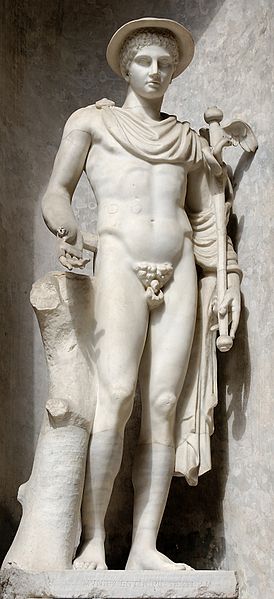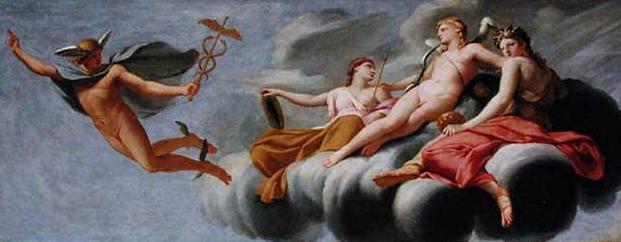Hermes

Hermes is the great messenger of the gods and additionally as a guide to the Underworld. Hermes was born on Mount Cyllene in Arcadia. An Olympian god, he is also the patron of boundaries and of the travelers who travel across them, of shepherds and cowherds, of the cunning of thieves and liars, of orators and wit, of literature and poets, of athletics and sports, of weights and measures, of invention, and of commerce in general. His symbols include the tortoise, the rooster, the winged sandals, the winged hat, and the caduceus (given to him by Apollo in exchange for the lyre).
The Homeric hymn to Hermes invokes him as the one “of many shifts (polytropos), blandly cunning, a robber, a cattle driver, a bringer of dreams, a watcher by night, a thief at the gates, one who was soon to show forth wonderful deeds among the deathless gods.”
He protects and takes care of all the travelers, miscreants, harlots, old crones and thieves that pray to him or cross his path. He is athletic and is always looking out for runners, or any athletes with injuries who need his help.
Hermes is a messenger from the gods to humans, sharing this role with Iris. Hermes delivered messages from Olympus to the mortal world. He wears shoes with wings on them and uses them to fly freely between the mortal and immortal world. Hermes was the second youngest of the Olympian gods, being born before Dionysus.
Hermes, as an inventor of fire, is a parallel of the Titan, Prometheus. In addition to the lyre, Hermes was believed to have invented many types of racing and the sports of wrestling and boxing, and therefore was a patron of athletes.
Hermes is a deified trickster. Hermes also served as a psychopomp, or an escort for the dead to help them find their way to the afterlife (the Underworld in the Greek myths). In many Greek myths, Hermes was depicted as the only god besides Hades, Persephone, Hecate, and Thanatos who could enter and leave the Underworld without hindrance.
Hermes often helped travelers have a safe and easy journey. Many Greeks would sacrifice to Hermes before any trip.
In the fully-developed Olympian pantheon, Hermes was the son of Zeus and the Pleiade Maia, a daughter of the Titan Atlas. Hermes’ symbols were the cock and the tortoise, and he can be recognized by his purse or pouch, winged sandals, winged cap, and the herald’s staff, the kerykeion. The night he was born he slipped away from Maia and stole his elder brother Apollo‘s cattle.
Also Known As Mercury
Lead Designers Steven Creech and Kevin Ruesch Lead Editor Steven Schend Creative Director Jim Butler
Hermes lost no time in beginning his career of thievery and general mischief. Born early in the morning, the precocious infant Climbed out of his crib, took a long walk, and invented the lyre from the shell of a tortoise that he killed after it had crossed his path. In the evening, before it got too dark, he stole fifty of Apollos oxen and hid them in a cave. Hermes slaughtered two of the beasts, cooked and ate part of the flesh, burned the rest, and nailed their skins to a rock. When he arrived home, he lay down quietly in his crib and was found there the next morning with his eyes closed, when Apollo came to make a complaint to the childs mother, Maia. Upon realization that justice was not to be received from a doting mother, Apollo appealed to Zeus, who compelled his young son to return the cattle. However, when Apollo heard Hermes play the lyre, he was so delighted that he told the child that he could keep the cattle, and they became good friends. Eventually, Hermes gave Apollo the lyre he had built and Apollo gave him the Caduceus in exchange. Hermes is also said to have stolen Hephaestus tools, Zeus’s scepter, Poseidon’s trident, Ares’ sword and, a truly Herculean task, Aphrodite’s girdle.

One of Hermes’ most important duties is to ferry the shades or the ghosts of the dead from the lands of the living to the Underworld. As a friendly guider of the living as well as the dead, Hermes spends much of his time among shepherds, to whom he is the patron god. He also visits with nymphs and shepherdesses, by whom he has been the father of countless children, including Pan and Daphnis, the inventor of pastoral poetry. He is the father of Autolycus, the prince of thieves, by Chione.
Hermes helps and guides humans in their activities, and is credited with introducing weights and measures, as well as dice to the mortals. He is the giver of good luck and has a hand in all secret dealings and subterfuges. He gave a sickle of Admanate to Perseus, which the hero used to sever Medusas head, and he also gave Odysseus a plant known as moly, which made the hero immune to the magic of Circe. Hermes has even had to rescue Zeus and restore his health, when Zeus encountered the monster Typhon. Similarly, he has rescued Ares, who was confined in a bronze storage jar for thirteen months, after being captured by Otus and Ephialtes.
Relics & Rituals: Olympus
© 2004 White Wolf Publishing, Inc. Distributed for Sword and Sorcery Studios by White Wolf Publishing, Inc.
By W. Jason Peck, Aaron Rosenberg, Christina Stiles and Relics & Rituals: Olympus team
This long rod has two snowy wings on either side near the top, and two serpents intertwined around it. The Caduceus is the symbol of Hermes, the messenger of the gods and the god of trickery. Anyone holding it cannot be surprised or ambushed (no sneak attacks or surprise attacks), it deals 1d6 points damage if used in melee combat. Three times each day the rod gives its wielder the power to fly as per the spell, for up to one hour at a time.The serpents grant the owner the power to speak with animals at will, and to charm animal three times each day.
The rod also gives its wielder a +5 competence bonus on Pick Pockets, move silently, Hide, and Disable Device checks.
When used by someone other than Hermes without his permission, however, the two serpents come to life and bite the wielder, dealing 2d8 points of damage plus poison(injury DC 30, primary and secondary damage 1d4 points of permanent Strength drain). Only Hermes or one of his priests may restore the lost ability score points.
Languages Spoken: Can communicate with any creature capable of language.
Deities & Demigods
Rich Redman, Skip Williams, James Wyatt
HERMES
Messenger of the Gods; God of Thieves; God of Commerce; Guide to the Dead; Patron of Travelers
Intermediate God
Symbol: Caduceus (winged staff with two entwining serpents), Olive Tree and Winged Boots
Home Plane: Olympus
Alignment: Chaotic good
Portfolio: Travel, trade, theft, gambling, running
Traditional Allies: Zeus, Maia (mother), and Apollo (half-brother)
Traditional Foes: Giants
Servitor Creatures : Halflings
Divine Artifacts: Caduceus (a winged rod with two snakes entwined), winged boots
Worshipers: Rogues, illusionists, travelers, merchants, athletes
Favored Class: Bard, Rogue, Sorcerer, Wizard
Cleric Alignments: CG, CN, NG
Domains: Luck, Trickery, Travel , Trade,
Favored Weapon: Staff
Benefits: clerics of Hermes gain evasion (as the rogue), while favored classes gain the ability to haste twice per day as the spell.
The deity of travelers, merchants, thieves, gamblers, athletes and elegant speakers, Hermes (her-meez) appears as a handsome youth carrying a white caduceus. He wears a winged helm and sandals.
He is perhaps the shrewdest and most cunning of all the Olympian deities; he began his career as a thief before he was a day old by stealing a herd of cattle from Apollo (who retains a distaste for thieves to this day).
Dogma
Hermes values fair play, so much that he often settles disputes among the Olympians. While he values the wit and daring required to accomplish a difficult theft, he frowns upon those who would steal from anyone who cannot afford the loss. He urges his followers to be dependable and prompt, but he despises tediousness and smiles when something unexpected upsets the predictable. Hermes abhors idleness. If one cannot do anything useful, Hermes says, the proper thing to do is travel and have new experiences.
Clergy and Temples
Hermes’s clerics seldom sit still. They’re always busy with something, or out traveling the world. They are found in a wide variety of occupations, serving as diplomats, judges, translators, moneychangers, surveyors, and explorers.
Wayside shrines to Hermes are common, but temples dedicated to Hermes are fairly rare.
| Hermes | |
| Rogue 20/Wizard 20 | |
| Large outsider (Chaotic, Good) | |
| Divine Rank | 15 |
| Hit Dice | 20d8+140 (outsider) plus 20d6+140 (Rog) plus 20d4+140 (Wiz) (780 hp) |
| Initiative | +24, always first (+20 Dexterity, +4 Improved Initiative, Supreme Initiative) |
| Speed | 120 ft., fly 360 ft. perfect. |
| AC | 82 (-1 size, +20 Dexterity, +15 divine, +28 natural, +10 deflection) |
| Attacks | Huge +5 speed holy Quarterstaff +64/+64/ +59/+54/+49 melee, Huge +5 defending Quarterstaff +64/+59/+54 melee; or spell +61 melee touch or +74 ranged touch |
| Damage | Huge +5 speed holy Quarterstaff 1d8+12, Huge +5 defending Quarterstaff 1d8+8; or by spell |
| Face/Reach | 5 ft. by 5 ft./10 ft. |
| Special Attacks | Sneak attack +13d6, crippling strike, domain powers, salient divine abilities, spell-like abilities. |
| Special Qualities | Divine immunities, DR 50/+4, understand, speak, and read all languages and speak directly to all beings within 15 miles, remote communication, godly realm, teleport without error at will, plane shift at will, familiar (birds), evasion, improved evasion, traps, opportunist, slippery mind, uncanny dodge (cannot be flanked, +4 against traps), SR 47, divine aura (1,500 ft., DC 35). |
| Saves | Fort +54, Ref +67, Will +55. |
| Abilities | Strength 24, Dexterity 50, Constitution 24, Intelligence 31, Wisdom 26, Charisma 30. |
| Skills* | Alchemy +45, Appraise +55, Balance +59, Bluff +65, Concentration +42, Craft (leatherworking) +45, Diplomacy +83, Disable Device +55, Escape Artist +55, Gather Information +45, Hide +65, Intimidate +37, Intuit Direction +33, Jump +36, Knowledge (arcana) +55, Knowledge (geography) +65, Knowledge (history) +65, Knowledge (local) +55, Knowledge (nobility and royalty) +35, Knowledge (religion) +35, Knowledge (the planes) +65, Listen +55, move silently +85, Open Lock +75, Perform +35, Pick Pocket +79, Profession (guide) +63, Profession (scribe) +63, Scry +45, Search +55, Sense Motive +53, Spellcraft +45, Spot +45, Tumble +67, Wilderness Lore +43. *Always receives a 20 on checks. |
| Feats | Alertness, Ambidexterity, Brew potion, Combat Reflexes, Craft Rod, Craft Staff, Craft Wand, Craft Wondrous Item, Dodge, Empower Spell, Combat Expertise, Fleet of Foot, Greater Two-Weapon Fighting, Improved Initiative, Improved Two-Weapon Fighting, Jack of All Trades, Maximize Spell, Mobility, Quick Draw, Quicken Spell, Run, Scribe Scroll, Spring Attack, Superior Expertise, Two-Weapon Fighting. |
| Divine Immunities | Ability damage, ability drain, acid, cold, death effects, disease, disintegration, electricity, energy drain, mindaffecting effects, Paralysis, poison, sleep, stunning, transmutation, imprisonment, banishment. |
| Salient Divine Abilities | Alter Form, Alter Reality, Alter Size, Arcane Mastery, Avatar, Divine Blast, Divine Celerity, Divine Shield, Divine Dodge, Divine Glibness, Divine Rogue, Divine Sneak Attack, Free Move, * Gust of Wind, Supreme Initiative, Extra Domain (Good), Extra Domain (Luck), Spontaneous Wizard Spells. *Unique ability, described below. |
| Domain Powers | Cast chaos spells at +1 caster level; cast good spells at +1 caster level; 15/day reroll a die roll once after it is made; 15 rounds/day freedom of movement. |
| Spell-Like Abilities | Hermes uses these abilities as a 25th-level caster, except for chaos spells and good spells, which he uses as a 26th-level caster. The save DCs are 35 + spell level. Aid, animate objects, astral projection, Blade Barrier, break enchantment, change self, chaos hammer, cloak of chaos, confusion, dimension door, dispel evil, dispel law, entropic shield, expeditious retreat, false vision, find the path, fly, freedom of movement, holy aura, holy smite, holy word, invisibility, locate object, magic circle against evil, magic circle against law, miracle, mislead, nondetection, phase door, polymorph any object, protection from energy, protection from evil, protection from law, screen, shatter, spell turning, summon monster IX (as chaos or good spell only), teleport without error, time stop, word of chaos. |
Wizard Spells/Day: 4/7/7/6/6/6/6/5/5/5; base DC = 20 + spell level.
Gust of Wind (unique salient divine ability): On any round when Hermes takes a move action (or moves as a free action), he can create a blast of light, moderate, strong, or severe wind that spreads 150 feet along his path. See Table 3-17: Wind Effects in the DUNGEON MASTER’s Guide.
Possessions:
Caduceus, a winged staff entwined with two serpents, is Hermes’s symbol, given to him by Apollo. It allows him to control animals and beasts as if using the Control Creatures salient divine ability. This item only functions in the hands of creatures with a divine rank of 0 or higher.
Caster Level: 25th;Weight: 8 lb.
Other Divine Powers
As an intermediate deity, Hermes automatically receives a die result of 20 on any check. He treats a 1 on a saving throw or attack roll normally and not as an automatic failure. He is immortal. Senses: Hermes can see, hear, touch, and smell at a distance of fifteen miles. As a standard action, he can perceive anything within fifteen miles of his worshipers, holy sites, objects, or any location where one of his titles or name was spoken in the last hour. He can extend his senses to up to ten locations at once. He can block the sensing power of deities of his rank or lower at up to two remote locations at once for 15 hours.
Portfolio Sense: Hermes senses the beginning or end of any journey of three miles or more the instant it happens and retains the sensation for fifteen weeks after the event occurs. He likewise senses any theft, wager, or negotiation.
Automatic Actions: Hermes can use Craft (leatherworking), Disable Device, Knowledge (arcana), Knowledge (geography), Knowledge (history), Knowledge (local), Knowledge (nobility and royalty), Knowledge (religion), Knowledge (the planes), Open Lock, Profession (guide), or Profession (scribe) as a free action if the DC for the task is 25 or lower. He can also use Pick Pocket as a free action (though each such attempt requires a check). He can perform up to ten such free actions each round.
Create Magic Items: Hermes can create a magic weapon from a dagger, dart, light mace, sap, shortbow, composite shortbow, short sword, club, heavy mace, morningstar, quarterstaff, rapier, or any type of crossbow as well as any item that conceals or disguises the user, such as a ring of invisibility, a robe of blending, a hat of disguise, or any item that involves travel on the same plane (anything from boots of striding and springing to a carpet of flying), as long as the items market price does not exceed 200,000 gp.
Avatars
Hermes uses avatars that look just like he does. He generally employs them to deliver messages for Zeus and the other greater Olympian gods and to oversee contests to ensure fair play.
Avatar of Hermes:
As Hermes except divine rank 7;
AC 66 (touch 46, flat-footed 66);
Atk +56/+56/+51/+46/+41 melee (1d8+12, +5 speed holy Quarterstaff), +56/+51/+46 melee (1d8+8, +5 defending Quarterstaff), or spell +53 melee touch or
+66 ranged touch;
SQ DR 42/+4, fire resistance 27, SR 39, divine aura (700 ft., DC 27); SV
Fort +46, Ref +59, Will +47;
all skill modifiers reduced by 8.
Salient Divine Abilities: Arcane Spell Mastery, Automatic Metamagic (quicken wizard spells), Divine Dodge, Divine Sneak Attack, Extra Domain (Good), Extra Domain (Luck), Gust of Wind, Spontaneous
Wizard Spells, Supreme Initiative. Unique ability, described above.
Spell-Like Abilities: Caster level 17th; saving throw DC 27 + spell level.
Winged Sandals of Hermes

Relics & Rituals: Olympus
© 2004 White Wolf Publishing, Inc. Distributed for Sword and Sorcery Studios by White Wolf Publishing, Inc.
By W. Jason Peck, Aaron Rosenberg, Christina Stiles and Relics & Rituals: Olympus team
These winged sandals grant their wearer the ability to fly at a rate of up to 120 feet with excellent maneuverability and requiring no more concentration than walking. The sandals can maintain the flight ability for four hours each day. When not actively flying, the sandals actually hover just above the ground, allowing the wearer to ignore earthquakes and any other instabilities of the ground, and to move across any surface at his full movement rate.

 Buy me a coffee
Buy me a coffee